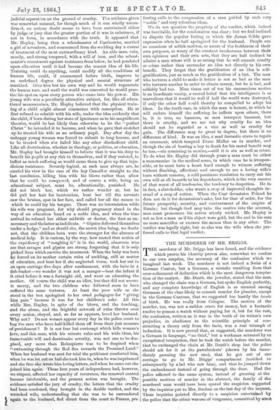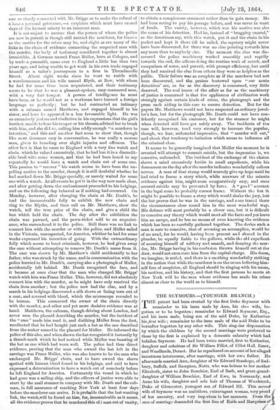THE MURDERER OF MR. BRIGGS.
THE murderer of Mr. Briggs has been found, and the evidence which proves his identity proves also, somewhat we confess to our own surprise, the accuracy of the confession which we imagined last week. The murderer is not indeed a Swiss of a German Canton, but a German, a mistake resulting from that over-refinement of deduction which is the most dangerous tempta- tion of the analyst. Mr. Death, the jeweller, stated that the man who changed the chain was a German, but spoke English perfectly, and any complete knowledge of English is so unusual among Germans of the class likely to commit murder for plunder, except in the German Cantons, that we suggested too hastily the locale of birth. He was really from Cologne. The motive of the murder, too, was not a sudden crave for money, but a fantastic resolve to possess a watch without paying for it, but for the rest, the confession, written as it was in the teeth of its writer's own prejudice, in obedience to the scientific principle of con- structing a theory only from the facts, was a real triumph of induction. It is now proved that, as suggested, the murderer was a German in language, "no thief," but a workman actuated by an exceptional temptation, that he took the watch before the murder, that he exchanged the chain at Mr. Death's shop lest the police should ask for it at the pawnbrokers' (shown by his imme- diately pawning the new one), that he got out of one carriage to go to Mr. Briggs' compartment (testified to subsequently by a lad who saw him), and that he jumped down the embankment instead of going through the door. Had the police adhered to the same system, instead of guessing at the possible motives of murder in the abstract, the family of the murdered man would have been spared the suspicion suggested by the inquiries put to Mrs. Buchan on the last day of the inquest. Those inquiries pointed directly to a suspicion entertained by the police that the crime was one of vengeance, committed by some
one so closely connected with Mr. Briggs as to make the refusal of a loan a personal grievance, —a suspicion which must have caused days of the keenest misery to an innocent man.
It is not unjust to assume that the person of whom the police are now in pursuit is though still untried the murderer, for bizarre as the motive for the crime may be, and slight as are many of the links iu the chain of evidence connecting the suspected man with the murder, the body of testimony considered together is almost irresistible. A German named Franz Muller, born at Cologne, and by trade a gunsmith, came over to England a little less than two years ago, and being unable to get work in his own trade engaged himself as a tailor's journeyman to a firm in Threadneedle Street. About eight weeks since he went to reside with a warehouseman and his wife named Blyth, at Bow, with whom he had for some time been acquainted, and their testimony seems to be that he was a pleasant-spoken, easy-mannered man, with a very fair temper. A person of intelligence he must have been, or he would not as a workman have learned a foreign language so perfectly ; but he had contracted an intimacy with a cabman named Matthews, and engaged himself to his sister, and here he appeared in a less favourable light. He was so excessively jealous and vindictive in his expressions that the girl's brother, unable to bear his temper or his threats,advised her to break with him, and she did so, calling him oddly enough " a murderer in intention," and this and another fact seem to show that, though like most Germans easy in conversation, he was really a morose man, given to brooding over slight injuries and offences. The other fact is that he came to England with a very fine watch and chain, which he valued excessively, that he had lost it in a discredit- able broil with some women, and that he had been heard to say repeatedly he would have a watch and chain out of some one. This passion to " recover " his watch seems to have been the im- pelling motive to the murder, though it is still doubtful whether he had marked down Mr. Briggs specially, or merely waited for some one with a watch. At all events he got it in the way now made clear, and after getting down the embankment proceeded to his lodgings, and on the following day behaved as if nothing had occurred. On Monday, however, after changing the chain at Mr. Death's, he had the inconceivable folly to exhibit the new chain and ring to the Blyths, and then call on Mr. Matthews, show the watch, tell the true price of the chain, and give a child the box which held the chain. The day after the exhibition the chain was pawned, and the pawn-ticket sold to an acquaint- ance, who surrendered it to the police. Still there was no link to connect him with the murder or with the police, and Muller sailed in the Victoria, unsuspected, for America, whither he had for some weeks expressed his intention of going. With the extraordinary folly which seems to beset criminals, however, he had given away the case without attempting to remove Mr. Death's name from it. The case was shown by Mr. Matthew's child accidentally to her father, who was struck by the name, and in communication with the police hurried to Mr. Death's, carrying also a photograph of Willer, accidentally left behind. Mr. Death recognized the face, and it became at once clear that the man who changed Mr. Briggs' watch with him was Franz Muller. This, however, did not absolutely -connect him with the murder, as he might have only received the chain from another ; but the police now had the clue, and by a search in his lodgings discovered a silk sleeve or lining torn out of a coat, and covered with blood, which the microscope revealed to be human. This connected the owner of the chain directly with the murder, and other and yet more decisive evidence was at hand. Matthews, the cabman, though driving about London, had never seen the placard describing the murder, but the incident of the "case" made him read it, and disliking Miller from the first, recollected that he had bought just such a hat as the one described from the maker named in the placard for Muller. He informed the police of this also, and when shown the bat recognized it instantly by a thumb-mark which he had noticed while Miller was boasting of the hat as one which had worn well. The police had thus direct evidence, proving that the man who owned the hat left in the carriage was Franz Muller, who was also known to be the man who exchanged Mr. Briggs' chain, and to have owned the sleeve spotted with human blood found in his lodgings, and said to have expressed a determination to have a watch out of somebody before he left England for America. Fortunately the vessel in which he had gone was a sailing ship, and the officers of justice were able to start by the mail steamer in company with Mr. Death and the cab- man, in full assurance of reaching New York at least four days before the murderer can arrive. It is probable that the last wanting link, the watch,will be found on himr, for, inconceivable as it seems, all the evidence proves that he murdered this tell man out of vanity, to obtain a conspicuous ornament rather than to gain money. He had been saving to pay his passage before, and was never in want of funds. The vanity, however, which was his motive was also the cause of his detection. Had he, instead of " bragging around," as the Americans say, with this watch, put it and the chain in his pocket and kept it there till he sailed, the mystery might never have been discovered, for there was no clue pointing towards him any more than to anybody else. The moment the clue was dis- covered the police machinery worked smoothly and rapidly towards the end, the officers doing the routine work of search, and comparison of notes, and pursuit, with prompt efficiency, but until they had received the clue from others they were as helple.ss as the public. Their failure was as complete as if the murderer had not been discovered, and the praises bestowed upon " our acute detectives" are, as far as the .discovery is concerned, very little deserved. The real lesson of the affair as far as the machinery of justice is concerned is that the appliances of civilization work strongly against certain kinds of crime, the photograph and the press each aiding in this case to ensure detection. But for the papers Mr. Matthews would not have suspected an ordinary jewel- ler's box, but for the photograph Mr. Death could not have con- fidently recognized his customer, but for the steamer he might when detected still have got safely away. The incidents of time case will, however, tend very strongly to increase the popular, though, we fear, unfounded impression, that " murder will out," and check that tendency to imitation which seems to influence alt the criminal class.
It seems to be generally imagined that Miller the moment he is arrested will attempt to commit suicide, but the impression is, we conceive, unfounded. The incident of the exchange of the chains. shows a mind excessively fertile in small expedients, while his demeanour on the day after the murder indicates wonderfully callous nerves. A man of that stamp would scarcely give up hope until he had tried to frame a story which, while unaware of the minute evidence against him, might seem comparatively easy, and once secured suicide may be prevented by force. A " good " account in the legal sense he probably cannot frame. Without the hat it might be possible to frame a story which would shake the jury, but the hat proves that he was in the carriage, and once traced there the circumstances close round him in the most wonderful way.. His defence will most probably be a clever one, but it is difficult to conceive any theory which would meet all the facts and yet leave him an escape, and he has no means of even knowing the evidence which has been so carefully gathered together. The device such a man is sure to conceive, that of accusing an accomplice, would be of no avail, for he would, having been present ani shared in the plunder, be equally liable to the gallows, while the old expedient of accusing himself of robbery and assault, and denying the mur- der, Mr. Briggs having in his confusion thrown himself out at the door, would not exonerate him from the capital charge. His doom,. we imagine, is sealed, and there is s,mething wonderfully strikiag in the notion that while the murderer is on the ocean believing him- self free of suspicion, all England should be ringing with his name, his motives, and his history, and that the first persons he meets at. New York will be the men whose evidence has made his crime• almost as clear to the world as to himself.































 Previous page
Previous page